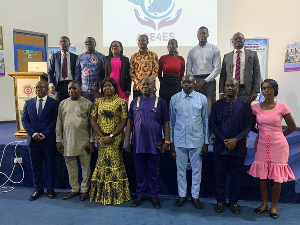The Crops Research Institute (CRI) has initiated a groundbreaking project to enhance environmentally friendly and sustainable maize and rice production in Ghana and three other African nations.
Known as the ‘Agroecology and Circular Economy for Ecosystem Services (ACE4ES)’, this two-year project seeks to combat the detrimental effects of unproductive farming practices on the environment in Ghana, Benin, Nigeria, and Tanzania.
The project consortium has identified the excessive use of agro-inputs like inorganic fertilizers and the release of chemicals such as methane and black carbon, which contribute to soil and environmental pollution.
Funded by the Clean Air Coalition (CCAC) under the United Nations Environment Programme (UNEP), the project aims to implement agroecology and circular economy strategies to reduce emissions in maize and rice production.
The primary goal is to evaluate the effectiveness of these technologies in decreasing short-lived climate pollutant emissions from agricultural activities.
Furthermore, the initiative seeks to engage policymakers, researchers, and stakeholders to advocate for adopting agroecology and circular economy practices and facilitate the development of policies supporting sustainable agriculture.
Dr. Kwaku Onwona-Hwesofuo Asante, the Lead and Principal Investigator of the project, highlighted that the primary goal of ‘ACE4ES’ is to promote nature-friendly production methods, such as composting, among farmers. This initiative aims to help farmers achieve higher yields while also ensuring environmental sustainability.
“The use of fertilisers, pesticides, etc. makes agriculture risky. When we’re able to reduce the inputs and substitute with natural inputs like compost, rotational farming and other practices, it tends to protect the environment and give us the yield that we need,” Dr Asante explained.
During the ACE4ES launch, Madam Ophelia Mensah Hayford, the Minister for Environment, Science, Technology, and Innovation, emphasized the government’s commitment to environmental sustainability. She highlighted the importance of initiatives that promote climate-smart agriculture in achieving environmental goals.
The minister subsequently expressed her strong support for the ACE4ES project, recognizing its potential to reduce the use of harmful chemicals in maize and rice production. This, she explained, would have positive impacts on both the environment and human health.
Furthermore, she announced that the government of Ghana is actively exploring the development of policies aimed at phasing out harmful chemicals and emissions that pose risks to human health and the environment. This proactive approach demonstrates Ghana’s dedication to creating a healthier and more sustainable future for its citizens.
“Whenever Scientists research and bring up a project, it informs policy decision-making. Consequently, the government is eager to develop policies aimed at phasing out harmful chemicals and emissions that pose risks to human health,” she explained.
She, however, expressed concern about the low awareness of its activities among the public.
She noted, “I’ve observed with enthusiasm the many novel things the CSIR and its agencies are doing that lack publicity. The onus lies with us to talk about what we’re doing to create the needed platforms for partnerships, network and unlock private capital. We’re better positioned to tell our stories. Let’s therefore enhance communication and advocacy in the things we do within the scientific community.”
Dr. Kwaku Onwona-Hwesofour Asante, the Project Lead and Principal Investigator, stated that the initiative was developed in response to the challenges present in the current food system. He emphasized that numerous factors contribute to the unproductivity of agriculture, including the excessive use of pesticides and fertilizers. These inputs have a detrimental impact on pollinators, soil diversity, and water bodies.
“Agriculture has been environmentally degradative, and we are hoping that we can adopt a new approach which is agroecology and include circular economy principles in agriculture to ensure that we not only produce food sustainably but also mitigate the effects of climate change.”
Dr. Onwona-Hwesofour also mentioned that there are plans to extend the ACE4ES project to other African countries beyond the initial two-year period, pending additional funding from foreign nations.
Business News of Saturday, 25 May 2024
Source: Joseph Marfo, Contributor

















